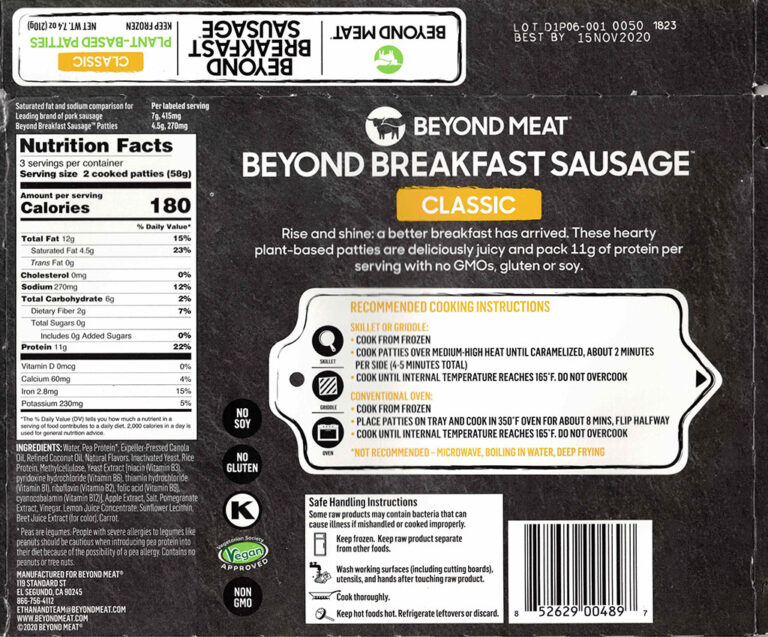

"They are not necessarily healthier than beef burgers," Alissa Rumsey, a registered dietitian, told CNBC in July. Some dietitians aren't completely sold on the plant-based burger craze either. "As for health, I will not endorse that, and that is about as big of criticism that I will do in public."Īnd Mackey isn't alone. I think people thrive on eating whole foods," Mackey says. "I don't think eating highly processed foods is healthy. Ingredients for Impossible Foods burger include water, soy protein concentrate, coconut oil, sunflower oil, potato protein, soy leghemoglobin (a group of protein found in animals and plants) and other natural flavors, according to its website. "The who are capturing the imagination of people - and I'm not going to name these brands because I'm afraid I will be associated with the critique of it," says Mackey, "but some of these that are extremely popular now that are taking the world by storm, if you look at the ingredients, they are super, highly processed foods."Īccording to Beyond Meat's website, ingredients for its plant-based patties include water, pea protein isolate, expeller-pressed canola oil, refined coconut oil, rice protein and other natural flavors, including apple extract and beet juice extract (for color). The market for meat substitutes is expected to hit $2.5 billion by 2023, according to Euromonitor estimates.īut Mackey, who has been a vegan for more than 20 years, isn't sold on the health benefits of plant-based meats. And Impossible Foods products are now in about 10,000 restaurants - including White Castle, Red Robin and Burger King - with plans to launch in grocery stores in September.
:max_bytes(150000):strip_icc()/Simply-Recipes-Plante-Based-Meat-LEAD-18-b4673c85f11f4a72b61e21d22e5d8d5b.jpg)
In May, Beyond Meat had the best IPO so far in 2019 surging more than 163% on the day of its market debut, in addition to making big deals with Carl's Jr., Dunkin, Del Taco and TGI Friday's to name a few. Today, both Beyond Meat and Impossible Foods have exploded. The company is also backed by Bill Gates. Momofuku Nishi in New York City began serving the Impossible Burger in July 2016. That same year, another plant-based meat start-up, Impossible Foods, released its alternative to the beef burger made from soy protein concentrate to restaurants. In June, Beyond Meat announced its new recipe uses a "blend of pea, mung bean and rice proteins." ) (The company has since made recipe updates to its original beef patties. In fact, I think all of their new products have been introduced at Whole Foods," John Mackey, co-founder and CEO of Whole Foods, tells CNBC Make It.Ī year later, Beyond Meat developed its first "beef" product made from plant proteins, which later morphed into its now-famous Beyond Burger in 2016. Even Tyson Foods Inc., the biggest maker of real meat in the US, invested and then invested again, catapulting the young El Segundo, California-based startup to a $1.3 billion valuation by 2018."We launched Beyond Meat. Along with the venture capitalists came investors from every corner of culture-Leonardo DiCaprio, the Humane Society of the United States and former McDonald’s Corp. Whereas the quinoa-and-bean patties of yore were for the crunchy set, Brown’s beef facsimile, concocted in a lab to look and taste like the real thing, meant the vast majority of meat eaters could give up their burgers without having to give up anything at all. Silicon Valley didn’t need much convincing that a better veggie burger could become the next world-changing disruption. “This,” he said, “is something that I feel is inevitable.” Just like technology had rendered the horse-drawn carriage obsolete, he told the crowd at the New York Times’ climate conference this past fall, so, too, would his system of breaking down plants transform the protein at the center of the plate. At Toronto’s annual Ideacity gathering three years later, he said his goal was to replicate the “ blueprint of meat.” By the time he appeared at Goldman Sachs Group Inc.’s Builders & Innovators Summit 2019, he explained that his mission demanded the urgency and scale the US mustered for World War II and that his products would simultaneously help solve heart disease, diabetes, cancer, climate change, natural resource depletion and animal welfare. In 2013 he took the stage at the Wired Business conference, explaining that the world had a very real greenhouse gas-emitting meat problem and that venture capitalists could make a bigger impact investing in fake meat than in solar energy. in 2009 with the then fantastical idea of making meat without animals, Ethan Brown has been giving the equivalent of one extremely long TED Talk.


 0 kommentar(er)
0 kommentar(er)
